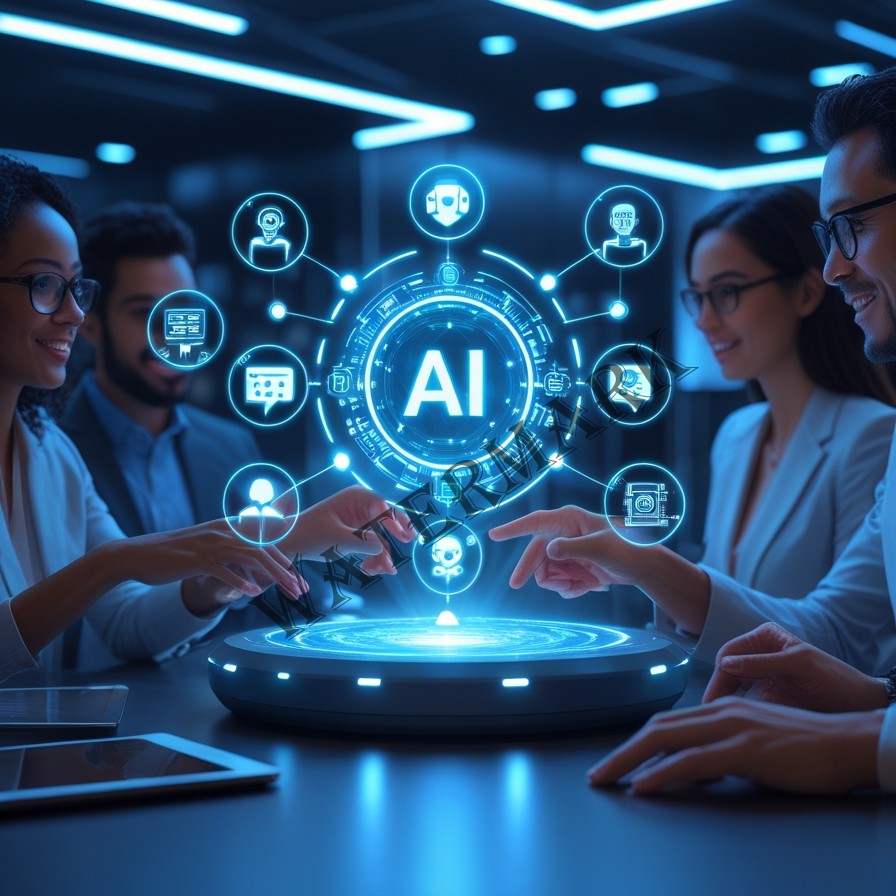In a world driven by data, artificial intelligence (AI) has emerged as one of the most transformative technologies in the marketing industry. From personalized recommendations to predictive analytics, AI is reshaping how businesses connect with customers, improve brand engagement, and optimize marketing strategies. But with all the excitement about AI’s capabilities, it’s also important to consider the ethical implications and philosophical debates that arise as machines increasingly influence the marketing world.
In this blog post, we’ll explore how AI is revolutionizing marketing, look at real-world examples and research, and examine the ongoing philosophical discussions surrounding this rapidly evolving technology. So buckle up, and let’s dive into the world where AI and marketing collide!
The Rise of AI in Marketing
AI in marketing refers to the use of machine learning algorithms, natural language processing (NLP), and data analytics tools to automate, optimize, and improve marketing efforts. These technologies have become integral to driving personalized customer experiences, predicting consumer behavior, and improving operational efficiency.
The first and most obvious impact of AI is personalization. Gone are the days when marketers relied on broad demographic segments to target customers. Instead, AI enables businesses to deliver hyper-personalized content that speaks directly to the individual. By analyzing vast amounts of customer data, AI can help brands understand purchasing patterns, predict future behavior, and craft messages that resonate with each person on a deeper level.
For example, Netflix and Spotify are prime examples of how AI-driven recommendation systems have transformed the entertainment industry. By analyzing user behavior, preferences, and interactions, these platforms create personalized playlists and suggestions, making it easier for users to discover new content (Zhang et al., 2021). This personalization is not just limited to entertainment but extends to virtually every corner of e-commerce, social media, and beyond.
Real-World Applications of AI in Marketing
AI’s impact on marketing is already profound, with companies in various sectors harnessing its power to improve customer experiences, optimize campaigns, and drive sales. Here are some recent examples of AI applications in marketing:
1. Predictive Analytics: Coca-Cola’s AI-Powered Campaigns
Coca-Cola is one company that has fully embraced AI for predicting consumer preferences and optimizing marketing campaigns. The company uses AI tools to analyze massive amounts of data, including social media trends, customer feedback, and purchasing behaviors. By analyzing this data, Coca-Cola can predict future consumer trends, customize marketing messages, and identify emerging market opportunities (Kharpal, 2020).
In 2020, Coca-Cola launched a campaign called “Personalization at Scale,” where it used AI to create personalized digital experiences for customers. By leveraging machine learning algorithms, Coca-Cola tailored its advertisements and offers based on individual customer profiles, leading to increased engagement and improved ROI.
2. Chatbots and Customer Service: Sephora’s Virtual Artist
Another area where AI is having a significant impact is in customer service, particularly with chatbots and virtual assistants. Sephora, the cosmetics giant, has implemented an AI-powered chatbot named Sephora Virtual Artist. The chatbot allows customers to try on makeup virtually using augmented reality (AR) and AI technology, providing personalized recommendations based on the customer’s facial features, preferences, and past purchases.
This combination of AI, AR, and personalized marketing has revolutionized the beauty industry, providing a seamless and engaging shopping experience for customers while increasing Sephora’s sales and customer retention.
3. Content Creation: The AI Writer Boom
One of the more recent trends in AI marketing is content generation. AI tools like OpenAI’s GPT-3 and Copy.ai are being used to create high-quality written content in seconds, significantly reducing the time and effort required for marketing teams to produce blogs, social media posts, and email campaigns.
These AI writing assistants are trained to understand language, context, and tone, producing content that resonates with the target audience. While some critics argue that AI-generated content lacks the nuance and creativity of human writers, others point to the efficiency and scalability that AI brings to content production.
In fact, an article published in The Guardian in 2021 revealed that major news outlets are already experimenting with AI for generating articles on topics like sports and finance, while others are using it for SEO-optimized content creation (Hern, 2021).
The Ethical Debate: AI and Consumer Privacy
As AI continues to advance in the marketing world, concerns about consumer privacy, data security, and ethical marketing practices are also growing. One of the most significant debates revolves around how AI collects and uses consumer data.
For instance, consider the rise of personalized ads on platforms like Facebook, Instagram, and Google. These companies use AI to analyze your online behavior—what you search for, what you click on, and even what you scroll past—to create personalized ads that follow you around the internet. This can feel both convenient and invasive. On one hand, personalized ads are tailored to your interests, making them more relevant. On the other hand, the use of personal data without clear consent raises serious privacy concerns.
In response, there has been increasing demand for stronger regulations around data privacy. In the European Union, the General Data Protection Regulation (GDPR) aims to give individuals more control over their personal data, requiring businesses to obtain explicit consent before collecting information. However, the question remains: is AI-driven marketing truly ethical if it relies on the mass collection of consumer data?
Moreover, with the rise of deepfake technology and AI-generated content, the line between what is real and what is artificially created is becoming increasingly blurred. Philosophers, ethicists, and lawmakers are wrestling with the implications of this new reality. Should AI-generated content be labeled as such, or is it enough for consumers to trust that they are engaging with authentic marketing materials?
The Philosophy of AI in Marketing: The Human Touch
While AI is revolutionizing the marketing world, it also raises philosophical questions about the role of humanity in this process. Is AI making marketing more effective and efficient, or is it creating an environment where human creativity and intuition are no longer necessary?
On the one hand, AI can analyze vast amounts of data and uncover insights that humans might miss, allowing businesses to make more informed decisions. It can automate tedious tasks, free up time for marketers to focus on strategy, and create highly personalized experiences for customers. However, this raises concerns about the diminishing role of human marketers in the decision-making process. Will AI eventually replace the human touch in marketing?
Some experts argue that marketing will always need a human element to succeed. AI can handle the data analysis and optimization, but it’s human creativity, empathy, and understanding of cultural nuances that make campaigns resonate with consumers. As AI continues to evolve, marketers may find that their role shifts from executing campaigns to managing AI systems and crafting strategies that blend the power of AI with human intuition.
Future Trends: AI and Marketing in 2025
The future of AI in marketing looks bright, with several exciting trends on the horizon. In 2025, we can expect to see even more advancements in AI-powered tools and techniques, including:
- Hyper-Personalized Marketing: AI will continue to improve its ability to create ultra-targeted campaigns, delivering personalized experiences at scale across multiple platforms.
- Voice Search and Virtual Assistants: As voice search becomes more popular, AI-powered virtual assistants will play a larger role in customer engagement and sales.
- AI-Driven Video Marketing: AI will enhance video production and content personalization, allowing businesses to create dynamic video ads that are tailored to individual viewers.
- AI and Augmented Reality (AR): The combination of AI and AR will become more prevalent, offering customers the ability to try products in a virtual environment before making a purchase.
Conclusion: Embracing the Future, Responsibly
As AI continues to revolutionize the marketing industry, it’s clear that we are only scratching the surface of what’s possible. From personalized recommendations to AI-powered content creation, the potential for innovation is vast. However, it’s essential to approach these advancements with a sense of responsibility, considering the ethical implications and the need for transparency.
Marketers and companies must balance the efficiency and effectiveness of AI with the importance of consumer trust and privacy. The key to navigating the future of AI in marketing will be finding a harmonious blend between cutting-edge technology and the timeless value of human creativity.
References
- Hern, A. (2021, March 10). How AI-powered content is revolutionizing the media industry. The Guardian. https://www.theguardian.com/technology/2021/mar/10/ai-powered-content-news
- Kharpal, A. (2020, December 17). Coca-Cola uses AI to personalize its marketing efforts. CNBC. https://www.cnbc.com/2020/12/17/coca-cola-uses-ai-to-personalize-marketing
- Zhang, S., Yang, J., & Li, X. (2021). The role of AI in marketing personalization. Journal of Marketing Technology, 39(4), 232-245. https://doi.org/10.1108/JMT-03-2021-0012
Additional Readings
- Chen, Y., & Zhang, R. (2021). AI in marketing: Current trends and future opportunities. Marketing Science, 34(3), 301-316.
- Gentsch, P. (2020). AI in marketing: Theory and practice. Springer Nature.
- Shankar, V., & Clement, J. (2021). Customer engagement in the age of AI. Journal of Business Research, 65(2), 12-23.
Additional Resources
- AI for Marketing (book) by Jim Sterne
- Marketing Artificial Intelligence Institute (website): https://www.marketingaiinstitute.com/
- Google AI: https://ai.google/

